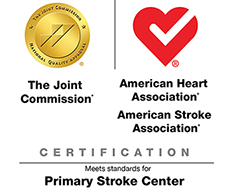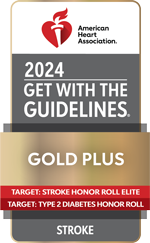Advanced Neurological Care
If you or a family member has been diagnosed with a neurologic disorder or disease such as Alzheimer’s disease or epilepsy or have experienced a stroke or other condition affecting the brain, you are not alone. About 50 million people in the United States suffer from a neurological condition, according to the National Institute of Neurological Disorders and Stroke. A neurological condition is defined as a disorder that affects the brain as well as the nerves found throughout the human body and the spinal cord.
Our neurology team at Aiken Regional Medical Centers and Aiken Physicians Alliance is here to care for adult patients with neurological conditions. Neurologists are specialists who treat disorders of the brain and spinal cord, peripheral nerves and muscles. Our neurologists can help identify the cause and symptoms of neurologic conditions and create a treatment plan that can help improve quality of life. Our care team provides diagnosis and treatment for stroke, dementia, multiple sclerosis, epilepsy, headache, traumatic brain injury, Parkinson’s disease and other neurological disorders.
Find a Doctor for Neurological Care
If you need a referral to a physician at Aiken Regional Medical Centers, call our free physician referral service at 803-761-6970 or search for a physician online.
Award-Winning Healthcare
-
 Aiken Regional Medical Centers is Certified by The Joint Commission as a Primary Stroke Center. This special achievement recognizes centers that meet national standards for advanced stroke care, established by The Joint Commission in collaboration with the American Stroke Association® and the American Heart Association®.
Aiken Regional Medical Centers is Certified by The Joint Commission as a Primary Stroke Center. This special achievement recognizes centers that meet national standards for advanced stroke care, established by The Joint Commission in collaboration with the American Stroke Association® and the American Heart Association®. -
U.S. News & World Report has named Aiken Regional Medical Centers a 2023-2024 High Performing hospital for Stroke. The hospital earned this designation in recognition of care that was significantly better than the national average, as measured by factors such as patient outcomes.

- Aiken Regional Medical Centers has also received the 2024 Get With The Guidelines® Stroke GOLD PLUS with Target: Stroke Honor Roll Elite and Target: Type 2 Diabetes Honor Roll with the American Stroke Association® and the American Heart Association®. This award recognizes the hospital’s exceptional achievement of treating 85 percent or higher of stroke patients for two years, according to advanced standards of stroke care.
Services
Our team offers a wide range of services to treat neurological disorders.
Stroke Care
A multidisciplinary team of healthcare professionals work to evaluate and treat all stroke emergencies 24 hours a day, seven days a week.
Inpatient Rehabilitation
Our 14-bed Inpatient Rehabilitation Center is dedicated to helping patients regain their independence following a stroke, brain injury or other neurological condition. Comprehensive care including physical, occupational and speech therapy is dedicated to getting patients back to their normal activities of daily life.
Treatment with BOTOX®
BOTOX® can be an effective treatment for some movement disorders. The neuroscience team at Aiken Regional offers BOTOX treatments for chronic headache, spasmodic torticollis and spasticity.
In-Office Treatments
We provide in-office treatments for neurological disease including dementia, multiple sclerosis, peripheral nerve and muscle disorders and Parkinson’s disease. Other neurologic conditions treated include balance problems, brain tumors, concussion, epilepsy, headaches and migraines, intracerebral hemorrhage, movement disorders, pituitary tumors, sleep disorders and stroke.
Diagnostic Testing
Diagnostic imaging and chemical and metabolic tests help physicians confirm or rule out a neurological disorder. New instruments and techniques also allow physicians to assess the living brain and monitor nervous system activity as it occurs. We use advanced tools for neurological treatments and to detect how well a particular therapy may be working.
Nerve Conduction and Electromyography (EMG)
Nerve conduction and electromyography is an EMG test to help find out if muscles are responding as they should to nerve signals. Nerve conduction studies help diagnose nerve damage or disease. When EMG tests and nerve conduction studies are done together, it helps providers tell if your symptoms are caused by a muscle disorder or a nerve problem. During an EMG, very fine needles or wires are inserted into a muscle to assess changes in electrical signals at rest and during movement. The needles are attached through wires to an EMG machine.
An EMG is usually done in conjunction with a nerve conduction study (NCS). An NCS measures the nerve’s ability to send a signal, as well as the speed (nerve conduction velocity) and size of the nerve signal. A set of recording electrodes is taped to the skin over the muscles or skin. Wires connect the electrodes to an EMG machine. A small electrical pulse (similar to the sensation of static electricity) is given on the skin a short distance away to stimulate the nerve to the muscle or skin. The electrical signal is viewed on the EMG machine. The physician then reviews the response to verify any nerve damage or muscle disease. There is minimal discomfort and no risk associated with this test, according to the National Institute of Neurological Disorders and Stroke.
Consultation Services
Our neurology team at Aiken Regional Medical Centers and Aiken Physicians Alliance offers consultative services for the following neurologic conditions:
- Bell’s Palsy: Muscle weakness that causes one side of the face to droop
- Carpal Tunnel Syndrome: A condition that causes numbness, weakness or tingling in the hand
- Cerebrovascular/Carotid Disease: A group of conditions or diseases that affect the blood vessels and blood supply to the brain
- Diabetic Neuropathy: A type of nerve damage, most often affecting the legs and feet, that can occur in people with diabetes
- Difficulty with Gait: Problems with walking, balance and coordination
- Dizziness/Vertigo: Feeling like your spinning, having difficulty keeping your balance
- Double Vision
- Foot Drop: Difficulty lifting the front part of the foot
- Headache/Migraine
- Multiple Sclerosis: A potentially disabling disease of the brain and spinal cord
- Muscle Pain/Cramps
- Myopathy: Any disease that affects the muscles that control voluntary movement in the body
- Neurodegenerative Brain Disorders (Alzheimer’s Disease, Parkinson’s Disease, Lewy Body Dementia, dementia/forgetfulness)
- Peripheral Neuropathy (tingling, numbness, paresthesias, weakness in arms or legs)
- Radiation of pain from neck to arm/hand or back to leg/foot
- Seizure/Epilepsy
- Sleep Disorders
- Spasmodic Torticollis: A painful condition in which your neck muscles contract involuntarily, causing your head to twist or turn to one side
- Spasmodic Dysphonia: A disorder affecting the voice muscles in the larynx; spasms in the muscles of the vocal cords interfere with the ability to speak
- Stroke
- Fainting
- Spasticity: Abnormal muscle tightness or stiffness, which might interfere with movement, speech or be associated with discomfort or pain
Our Team
The experienced neurologists at Aiken Regional Medical Centers and Aiken Physicians Alliance collaborate with other physicians across various specialties, such as primary and internal medicine specialists, to ensure an accurate and complete diagnosis and to provide an advanced and personalized treatment plan.
Additional Resources
- Dr. Misbba Khan of Aiken Physicians Alliance Neuroscience explains migraines, triggers, remedies and prevention.
- For information on neurological disorders, including common symptoms, methods of diagnosis, treatments and available therapies, view the fact sheets published by the National Institute of Neurological Disorders and Stroke.
